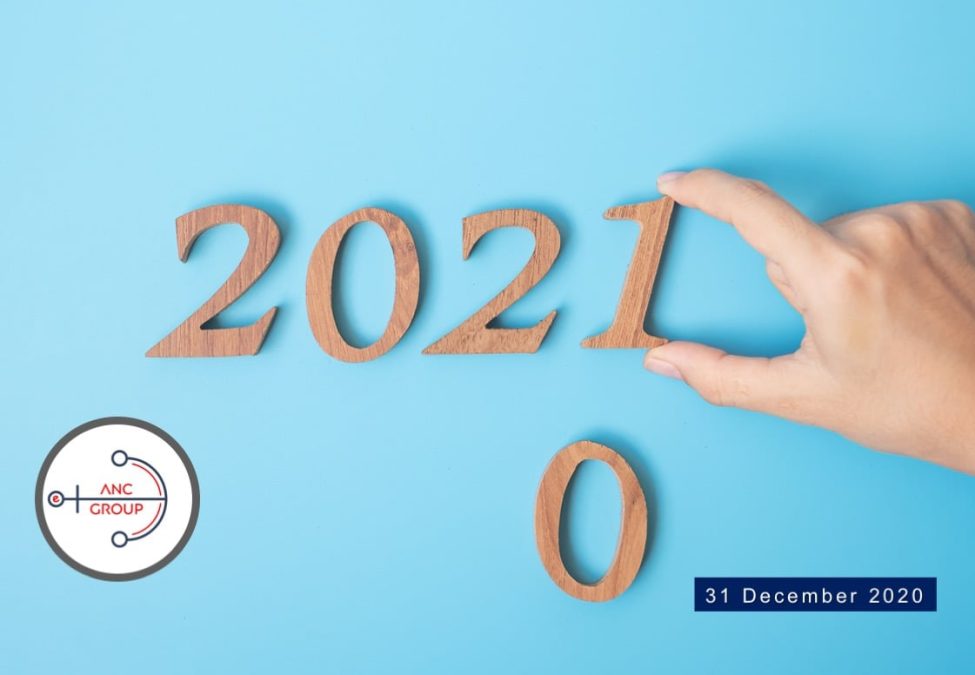
TaxLetter 28
The last TaxLetter for 2020
The pandemic is sending many businesses in Malaysia on a roller-coaster ride. At ANC Group, we remained watchful and persistent abide the turbulent economic conditions, supporting our clients and businesses on the road to recover in the year 2021. We also work closely with new entrepreneurs during this unprecedented time, guiding them to new heights.
The pandemic demonstrated the importance of technology as it can no longer be seen as utility working in the background, but a strategic asset for the success of every institution. ANC Group is recognized as a Technology Service Provider by the Malaysia Digital Economy Corporation (MDEC) and we are working closely with technology service providers in assisting businesses to transform into the digital era.
We at ANC Group recognize the importance of investing in people as future generation of professional accounts are expected to be tech savvy and possess cross-disciplinary knowledge and skills. Last month, ANC Group was accredited as ACCA approved employer which instill our commitment in nurturing future talents.
In this TaxLetter, we will continue to update you on the recent end tax updates. We hope that it will give you some insight as to what we can expect in the year 2021.
Income Tax Gazette Orders
Gazette Order P.U. (A) 306
Income Tax (Exemption) (No. 4) Order 2020
The Employment Retention Program (”ERP”) is a financial assistance program which managed by the
Social Security Organisation (“SOCSO”) and introduced under the Economic Stimulus Package 2020 for employer to retain his employee:-
(a)Who has been given a notice of unpaid leave for the period from 1 March 2020 until 30 June 2020;
(b)Whose salary is not more than RM4,000.00 a month; and
(c)Who is registered with and has contributed to the Employment Insurance System (“EIS”) under the Employment Insurance System Act 2017 [Act 800].
Employer who received ERP is exempted from payment of income tax and the employer shall maintain a separate account for the income exempted.
Gazette Order P.U. (A) 307
Income Tax (Exemption) (No. 5) Order 2020
Employee who received ERP from his/her employer is exempted from payment of income tax.
Gazette Order P.U. (A) 373
Income Tax (Exemption) (No. 6) Order 2020
In conjunction with the Budget 2016, the government has gazetted the proposal that:-
(a)Incentive for food production projects to be extended for applications received until 31 December 2020.
(b)Qualifying approved food productions to be extended.
Under the new Gazette Order, definition were provided as follows:-
(a)New food production project refers to project that is involved in (i) planting of industrial crop, vegetables, fruits, herbs, spices and cash crop; (ii) aquaculture; (iii) rearing of honey and urena lobata bees; (iv) rearing of cows, buffaloes, goats, sheep and deer; (v) deep sea fishing; and (vi) planting of feed mill.
(b)Expansion project refers to new food production project expansion, involve a new area of land; and approved by the Minister.
The Order is deemed to have come into effect on 1 January 2016.
Gazette Order P.U. (A) 374
Income Tax (Deduction of Investment in New Food Production Project or Expansion Project) Rules 2020
For the purpose of ascertaining the adjusted income of a company from its business, the value of investment for the sole purpose of financing the qualified project under P.U. (A) 373 shall be allowed as a deduction in the basis period for a year of assessment (“YA”). The value of investment:-
(a)Shall be equivalent to the expenditure incurred by the related company in the basis period for the same YA;
(b)Shall be made for a period and up to an amount as approved by the Minister; and
(c)Shall not be disposed of within five (5) years from the date of the last investment made if such investment is in the form of holding of paid-up share capital in respect of ordinary shares.
The rules are deemed to have come into effect on 1 January 2016.
Gazette Order P.U. (A) 376
Income Tax (Deductions Not Allowed for Payment Made to Labuan Company by Resident) Rules 2018 (Amendment) 2020
For the purpose of Paragraph 39(1)(r) of the Income Tax Act (“ITA”) 1967, the amount not allowed for deduction for the types of payment made by a resident to a Labuan company are as follows:-
|
No. |
Type of Payment |
Amount Not Allowed for Deduction [P.U. (A) 375] 2018 |
Amount Not Allowed for Deduction [P.U. (A) 376] 2020 |
|
1 |
Interest Payment |
33% of payment amount |
25% (including payment in connection with financing in respect of commission, facility fee and advance fee) |
|
2 |
Lease Rental |
33% of payment amount |
25% |
|
3 |
Other Payments |
97% of payment amount |
No changes |
Gazette Order P.U. (A) 381
Income Tax (Cost of Renovation and Refurbishment of Business Premise) Rules 2020
In conjunction with the Stimulus Package and PENJANA, cost of renovation and refurbishment of business premise incurred will be allowed as a deduction in ascertaining the adjusted income of the business. The deduction must be:-
(a)Incurred within the period from 1 March 2020 until 31 December 2021;
(b)Used for purpose of business;
(c)Total amount of deduction subject to maximum amount of RM300,000; and
(d)Shall not apply for business who has claimed such expenses under S.33(1) of the ITA 1967, Capital Allowance under Schedule 2 or Schedule 3 of the ITA.
The renovation and refurbishment expenses are limited to:-
|
General electrical installation |
Lighting |
Gas system |
Water system |
|
Kitchen fittings |
Sanitary fittings |
Door, gate, window, grill and roller shutter |
Fixed partitions |
|
Flooring (include carpets) |
Wall covering (including paint works) |
False ceiling and cornices |
Ornamental features or decorations excluding fine art |
|
Canopy or awning |
Fitting room or changing room |
Recreational room for employee |
Air-conditioning system |
|
Children play area |
Reception area |
Surau |
The expenses shall not include designer fee, professional fee and purchase of antique (collectible item in nature).
Practice Note Update
Practice Note 4/2020 (dated 21 December 2020)
Clarification on Determining the Gross Income from Business Sources of Not More Than RM50 Million of a Company or Limited Liability Partnership (“LLP”)
The practice note supersedes Practice Note 3/2020 (dated 18 May 2020). The intention of the practice note is to provide clarification on the income tax provision and treatment under ITA 1967. The salient points are:-
|
No. |
Issues |
Implication / Tax Treatment |
|
1 |
Investment Holding Company (“IHC”) |
IHC under s.60F of the ITA 1967 (non listed IHC) is deemed to have no gross income from a business source hence not eligible for SME preferential tax treatment under Paragraph 2A, Part 1, Schedule 1 of the ITA 1967.
|
|
2 |
Company / LLP without gross income from business sources but have other income such as rent and interest |
Company is not eligible for tax treatment under Paragraph 2A, Part 1, Schedule 1 of the ITA 1967. LLP is not eligible for treatment under Paragraph 2D, Part 1, Schedule 1 of the ITA 1967. |
|
3 |
Company / LLP carrying on a business but does not have gross income from business sources due to current year business losses |
The Company / LLP is deemed to have gross income from a business source equivalent to NIL. Therefore, SME preferential rate under Paragraph 2A (Company) or Paragraph 2D (LLP), Part 1, Schedule 1 of the ITA 1967 is eligible. |
|
4 |
Company / LLP which does not have gross income from business source due to current year business loss caused by temporary closure of business operation |
The Company / LLP is deemed to have gross income from a business source equivalent to NIL. Therefore, SME preferential rate under Paragraph 2A (Company) or Paragraph 2D (LLP), Part 1, Schedule 1 of the ITA 1967 is eligible. |
|
5 |
Company / LLP which has gross income from foreign business source |
Gross income from foreign business sources shall be taken into account in determining gross business income not exceeding RM50 million. |
|
6 |
Company / LLP enjoying certain tax incentives such as Pioneer Status or Investment Tax Allowance |
Exempted gross income from business source shall be taken into account in determining gross business income not exceeding RM50 million. |
Operational Guidelines
Operational Guideline 4/2020 (dated 17 November 2020)
Guidelines on Monthly Tax Deduction (”MTD”) or Potongan Cukai Bulanan (“PCB”)
The objective of the Operational Guideline 4/2020 is to explain the employer’s responsibility of deducting MTD from the employees’ remunerations and determination of the MTD amount under the Rule 3, Income Tax (Deduction from Remuneration) Rules 1994.
Reference to Paragraph 4.1 of the Operational Guideline, employers are allowed to adopt two methodologies in determination of the MTD amount:-
(a)MTD Table; or
(b)Computerised MTD.
Effective 1 March 2019, the Inland Revenue Board (“IRB”) issues the MTD Table in electronic format : e-CP39. Previously, an employer can submit one-time submission without registration of a e-CP39 account. Effective 16 December 2020, every employer is required to register an account.
In respect of the computerised MTD, the systems which IRB recognises are:-
(a)Payroll systems approved by IRB; and
(b)System or application developed by IRB which includes PCB Calculator and e-PCB.
The Operational Guideline is similar to the MTD Guideline issued by the IRB in 2016 [LHDN.01/45/274/3-1(2016)]. We have encountered MTD audit cases whereby the Employers are using payroll systems approved by the IRB, however, the MTD audit findings do not follow the aforesaid guideline entirely. Instead, the IRB has a set of internal guidelines especially for MTD treatment of tax exempt allowance.
In addition to the employer’s responsibility, the IRB has also issued a new Notification of New Employee Form – CP22 [Pin. 1/2020]. The salient changes include the inclusion of employer’s particulars, passport numbers and citizenship.
Sales Tax Gazette Orders
Gazette Order P.U. (A) 367
Sales Tax (Persons Exempted from Payment of Tax) (Amendment) (No.3) Order 2020
New item 5A under Schedule A has been added in respect of:-
|
Item No. |
Persons |
Goods Exempted |
Conditions |
|
5A |
Franchise holder, distributor or dealer of motor vehicle including motorcycle approved by the Minister |
Locally manufactured motor vehicle including motorcycle |
a)The goods are purchased from a registered manufacturer; b)The goods are to be supplied to any Federal or State Government Department in Malaysia through his appointed agent; c)The appointed agent notifies in writing to the Senior Officer of Sales Tax; d)The application for the certificate of exemption shall be submitted together with the written notification; and e)Any other conditions as the Director General may deem fit to impose. |



